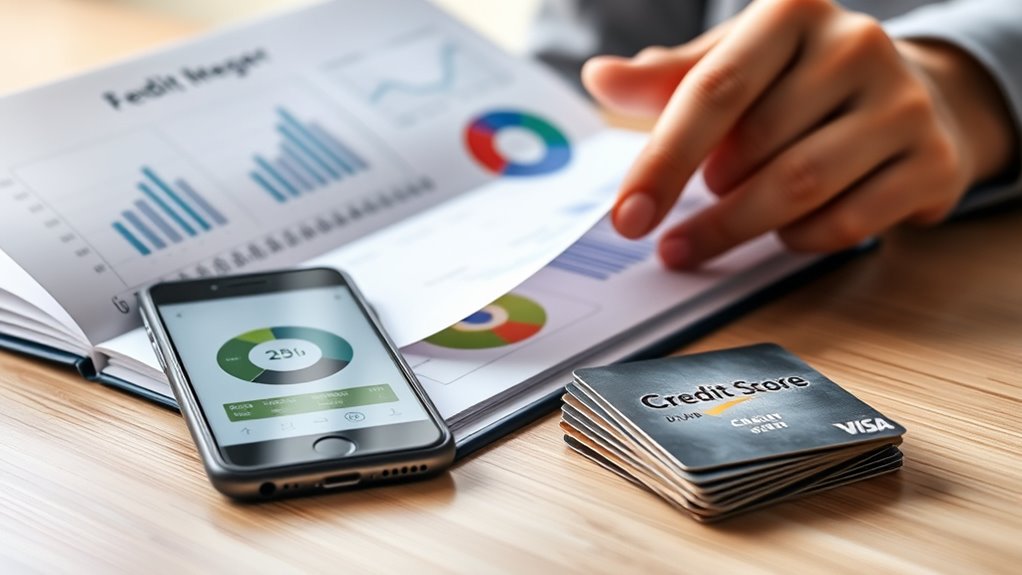To build a strong credit score for long-term stability, make all your payments on time and avoid late payments, which can stay on your report for years. Keep your credit utilization below 30% by paying balances in full and spreading spending across multiple cards. Regularly review your credit report to catch errors and fraud. Consistent responsible habits will improve your score over time, and if you keep going, you’ll discover even more ways to strengthen your credit health.
Key Takeaways
- Make all payments on time to build a positive payment history and improve credit scores.
- Keep credit utilization below 30% by paying balances in full and spreading spending across cards.
- Regularly review credit reports to identify and dispute errors or signs of fraud.
- Request credit limit increases responsibly to allow for higher balances without raising utilization.
- Maintain long-term responsible credit habits, including timely payments and low utilization, to ensure ongoing credit stability.

Building a strong credit score is essential for securing better loan terms, lower interest rates, and financial flexibility. To achieve this, you need to understand the importance of managing credit reports carefully and implementing effective credit utilization strategies. Your credit report is a detailed record of your borrowing history, including loans, credit cards, and payment habits. Regularly reviewing your report helps you catch errors, identify potential fraud, and stay aware of your financial standing. You can request free annual reports from major credit bureaus and review them thoroughly. Disputing inaccuracies ensures your report accurately reflects your creditworthiness, which directly impacts your score.
Managing credit reports also involves staying on top of your accounts. Make sure all your payments are made on time, as payment history is a significant factor in your credit score. Late payments can stay on your report for up to seven years, so developing a system to pay bills promptly is crucial. If you notice any missed payments, try to settle them quickly and maintain consistent, timely payments moving forward. Staying current on your accounts demonstrates responsible credit management, which boosts your score over time.
Credit utilization strategies are equally vital. This term refers to the percentage of your available credit that you’re using at any given time. Keeping your credit utilization low signals to lenders that you’re not overly reliant on credit and can manage your debt responsibly. Aim to use no more than 30% of your available credit limit on any card. For example, if your credit limit is $1,000, try to keep your balance below $300. Paying off your balances in full each month is one of the best ways to maintain low utilization and avoid debt accumulation. If you have multiple credit cards, spreading out your spending across them can help keep individual utilization ratios low.
Another effective credit utilization strategy is to request a credit limit increase, provided you have a good payment history. A higher limit means you can carry a larger balance without exceeding that 30% threshold, which can positively influence your score. Just avoid the temptation to spend more once your limit increases—responsible usage remains key.
Frequently Asked Questions
How Often Should I Check My Credit Report for Accuracy?
You should check your credit report at least once a year, but more often if you’re actively building credit or suspect errors. Regular credit monitoring helps you catch inaccuracies early and stay informed about report updates. By reviewing your report periodically, you guarantee everything is accurate, which boosts your credit score over time. Consider using free tools or services that provide ongoing report updates to stay on top of your credit health.
What Is the Impact of Closing Old Credit Accounts?
Closing old credit accounts is like trimming a cherished tree; it may affect your credit history and account longevity. When you close these accounts, your overall credit mix changes, potentially lowering your score. It can also shorten your credit history, making your profile seem less established. To maintain stability, keep old accounts open when possible, especially if they have positive payment histories, as they contribute to your long-term credit health.
How Do Different Types of Debt Affect My Credit Score?
Different types of debt impact your credit score in various ways. For example, installment loans like mortgages or student loans can boost your score if paid on time, while revolving debt like credit cards affects your credit utilization ratio. To improve your score, consider debt consolidation to lower your credit utilization and make payments consistently. Managing diverse debt types responsibly helps build a strong, stable credit profile over time.
Can I Build Credit Without a Credit Card?
Think of your credit journey as planting a garden; you don’t need a credit card to see blooms. You can build credit with alternative credit options like rent payments, utility bills, or peer-to-peer loans. These credit building strategies act as seeds, helping your score grow steadily. By staying consistent and making timely payments, you nurture your financial landscape, proving that credit can flourish even without a traditional credit card.
How Long Does It Take to Recover From a Credit Mistake?
It typically takes three to six months for credit repair after a mistake, but your financial recovery depends on how quickly you address the issues. You can speed up this process by paying bills on time, reducing debt, and checking your credit report for errors. Consistent good habits help rebuild your credit score faster, ensuring a smoother path to long-term financial stability.
Conclusion
Building your credit score is like planting a tree; with consistent care, patience, and smart habits, it will grow strong and steady over time. Remember, I once saw someone start with a small credit card and, years later, enjoy the benefits of a solid score that opened doors for big opportunities. Stay disciplined, keep your habits steady, and your financial future will flourish just like that thriving tree—lasting, dependable, and rooted in smart choices.








